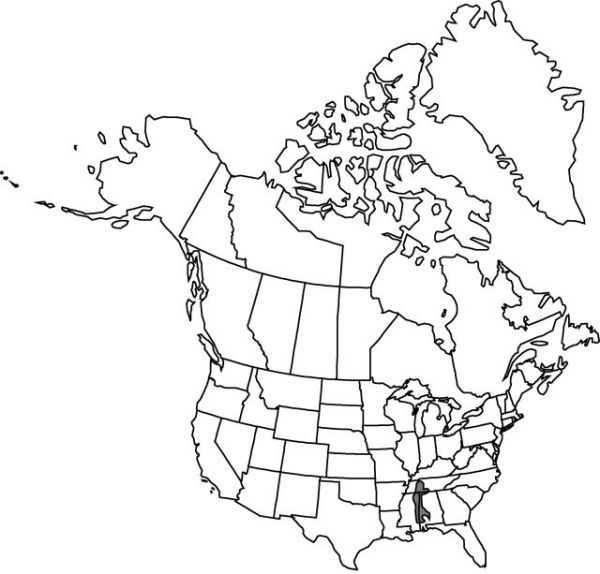Trillium stamineum
Biltmore Bot. Stud. 1: 23. 1901.
Rhizomes horizontal, brownish, short, thick, praemorse, not brittle. Scapes 1–3, round in cross section, 1.5–3 dm, slender to stout, pilose-pubescent, rarely glabrous. Bracts held well above ground, sessile; blade light silvery or bluish green with strong to faint mottling in darker colors, mottling becoming obscure with age, ovate-lanceolate to broadly ovate, 6.3–7.6 × 3.3–5 cm, larger bracts abaxially pilose-pubescent, margins entire, apex acute. Flower erect, odor strong, of carrion; sepals displayed above bracts, spreading to ± horizontal position, green, purple markings adaxially, lanceolate-elliptic, 17–40 mm, margins entire, purple, apex acuminate; petals long-lasting, spreading and carried in ± horizontal position unlike any other sessile trillium, very deep maroon to blackish red, rarely yellow, purple-streaked, with 1–2 spiral twists, narrowly elliptic to lanceolate or linear, narrow, 1.5–3.8 × 0.3–0.6 cm, rarely broader, thick-textured, margins entire, apex sharply acute to rounded, tips incurving slightly; stamens fully exposed, somewhat stiffly erect, dark purple, 16–24 mm, thick; filaments dark purple, 2–4 mm, basally dilated; anthers erect, straight, dark purple, 13–18 mm, thick, dehiscence extrorse; connectives dark purple, straight, coarse, flat, ± not extended beyond anther sacs; ovary dark purple, oval, 6-angled, 5–7 mm; stigmas erect, widely spreading, often strongly recurved or recoiled, distinct, purple, linear, 4–10 mm, slightly thickened basally. Fruits baccate, purple, odorless, ovoid, strongly 6-angled, sometimes winged, 2 × 1–1.5 cm, pulpy, moist. 2n = 10.
Phenology: Flowering spring (late Mar–mid May).
Habitat: Dry, upland woods of deciduous trees, deciduous forest mixed with pines, soil on limestone outcroppings, mesic woods, sandy flats along medium streams, steep wooded slopes, banks of rivers
Elevation: 50–200 m
Distribution

Ala., Miss., Tenn.
Discussion
Selected References
None.
